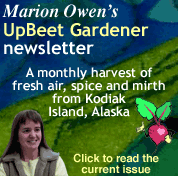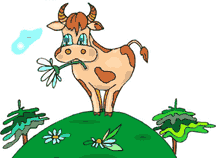
Manure Matters
How manures measure up
By Marion Owen, Fearless Weeder
for PlanTea, Inc. and
Co-author of Chicken Soup for the Gardener's Soul
FEATURE ARTICLE:

Tom Hanks' "Power of Four" solution
More good stuff:
Who is Marion Owen?
FAQs about PlanTea
Search Marion's articles, tips and recipes
Why grow organic?
News and press releases
Read love letters
How to link to this site
Need a speaker?
How to contact Marion
Visiting Alaska?
Come to Kodiak Island!
Go to home page

Marion's UpBeet Gardener
Newsletter has been
replaced by Marion's blog
which you can find at:
Marion Owen Lagniappe
In the 1960's, when the Central Intelligence Agency's (CIA) secret gadget-makers
invented a listening device for the Asian jungles, they disguised it so
the enemy wouldn't be tempted to pick it up and examine it: The device
looked like tiger droppings.
 The guise worked. Who would touch such a thing? The fist-sized transmitter
detected troop movements along the trails in Vietnam.
The guise worked. Who would touch such a thing? The fist-sized transmitter
detected troop movements along the trails in Vietnam.
While most people would find tiger droppings offensive, there are millions
of gardeners who look at look at manure as money in the bank. Many zoos,
for example, are marketing giraffe even hippopotamus droppings. Can you
guess what the best zoo doo is? (You'll find the answer at the end of
this article).
In the days when most families kept a milk cow and a flock of chickens,
manure was a primary garden fertilizer. But with changes in food production
practices and the advent of synthetic fertilizer in the 1930's, many gardeners
stopped using manure. Today, organic gardeners have rediscovered the benefits
of manure as a fertilizer, soil conditioner and compost
ingredient.
Where to find manure
Remember the story of the little boy who was digging through the pile of manure? "There has to be a pony in here somewhere," he told his father.

The hopeful lad probably lived on a farm, the best place for home gardeners
to get manure. Or any place where domestic animals are raised, for that
matter. Just listen for moos and clucking! Farm manure is often sold as
bagged manure and is available at garden centers and hardware stores.
Manures and composted plant materials add organic matter, which helps
soil retain moisture and structure which prevents compaction, and helps
prevent nutrients from leaching away. They also balance extremes in soil
pH.
|
"The
fairest thing in nature, a flower, |
Good poop, bad poop
What is good for the goose, is not always good for the gander. There are a few manures that should not be used, primarily those of meat eaters. According to Cornell University, "Homeowners should not use any manure from dogs, cats, or other meat-eating animals, since there is risk of parasites or disease organisms that can be transmitted to humans."
The most common sources of manure are horses, cattle, goats, sheep, rabbits and poultry. Below is a guide showing how manures measure up, nutrient-wise. While all animal manures are good sources of organic matter and nutrients, it's impossible to make a precise analysis, mostly because bedding materials vary so much. For example, manure with straw or sawdust will have a different nitrogen composition than pure manure. But it's useful to know whether the manure you're using is rich or poor in a particular nutrient such as nitrogen.

As you review the list, don't be misled by the N-P-K numbers that suggest manure is less powerful than chemicals. It is actually far better because it contains large amounts of organic matter, so it feeds and builds the soil while it nourishes the plants. This is one of the primary ways that organic fertilizers have a leg-up on chemical ones.
Still, many gardeners can't resist comparing the numerical amounts listed below with what they read on packages of synthetic fertilizers. Unfortunately, the values of manure and organic fertilizers in general, are often based on the relative amount of nitrogen (N), phosphoric acid (P) and potash (K) they contain. While these are important elements, "it is misleading to make a direct comparison between farm manures and chemical fertilizers on the basis of the relative amounts of N-P-K," says Jerry Minnich, author of Rodale's Guide to Composting.
Just like we need to eat to maintain our health, soil needs continual
replenishment of its organic matter to decompose into humus. Humus helps
create a rich, moisture-retaining soil and makes nutrients available to
plants.( For more organic gardening tips, read
the current issue of my UpBeet Gardener newsletter.)
How common manures measure up
| Manure | Chicken | Diary cow | Horse | Steer | Rabbit | Sheep |
| N-P-K | 1.1 .80 .50 | .25 .15 .25 | .70 .30 .60 | .70 .30 .40 | 2.4 1.4 .60 | .70.30 .90 |
Organic Gardening, by Sunset Publishing, and the Rodale Guide to Composting.
Note:
Nutrient values of manures vary greatly, depending on the diet and
age of the animals, and the nature and quantiy of bedding in the mix.
Chicken
manure
Poultry manure (chicken in particular) is the richest animal manure in
N-P-K. Chicken manure is considered "hot" and must be composted before
adding it to the garden. Otherwise, it will burn any plants it comes in
contact with.
Dairy
(cow) manure
 "Dairy
Manure may be the single most useful soil-builder around," says Dr. Fehsenfeld,
lifetime organic gardener and writer in Seattle, Washington. "Washed dairy
manure from healthy cows is just about perfect for garden use; it can
be used as a topdressing and for soil improvement," she adds. Dairy manure
is preferable to steer manure, which has a higher salt and weed seed content.
Though cow manure has low nutrient numbers, that's what makes ist safe
to use in unlimited quantities.
"Dairy
Manure may be the single most useful soil-builder around," says Dr. Fehsenfeld,
lifetime organic gardener and writer in Seattle, Washington. "Washed dairy
manure from healthy cows is just about perfect for garden use; it can
be used as a topdressing and for soil improvement," she adds. Dairy manure
is preferable to steer manure, which has a higher salt and weed seed content.
Though cow manure has low nutrient numbers, that's what makes ist safe
to use in unlimited quantities.
Horse
manure
Horse manure is about half as rich as chicken manure, but richer in nitrogen
than cow manure. And, like chicken droppings, it's considered "hot". Horse
manure often contains a lot of weed seeds, which means it's a good idea
to compost it using a hot composting method.
Steer
manure
Steer manure is one of the old standbys, but it's not the most beloved
because it often contains unwanted salts and weed seeds.

Rabbit
manure
Rabbit manure is even higher in nitrogen than some poultry manures and
it also contains a large amount of phosphorus--important for flower and
fruit formation.
Sheep
manure
Sheep manure is another "hot" manure. It is somewhat dry and
very rich. Manure from sheep fed hay and grain will be more potent than
manure from animals that live on pasture.
How to use manure
No matter what kind of manure you use, use it as a soil amendment, not
a mulch. In other words, don't put raw manure directly on garden soils.
Raw manure generally releases nitrogen compounds and ammonia which can
burn plant roots, young plants and interfere with seed germination. In
fact, it's recommended that all animal manure should be aged for at least
6 months. Many gardeners spread fresh manure in the fall and turn it in
to the top 6 inches of soil a month before spring planting.
A better treatment is to hot-compost manure before applying it to the
garden. Hot composting, where the pile reaches at least 150 degrees F)
helps to reduce the probability of passing dangerous pathogens on to people
who handle the manure or eat food grown with manure compost. (For more
information about compost, read my Compost Happens!
article.)
While the chance of contamination is slim, severe sickness and even death
may occur if contaminated produce is eaten. To be safe, either compost
your manure or apply it in the fall after harvest. Wash up after handling
manure and don't forget to rinse the vegetables and fruit well before
you eat them--always a good idea whether your use manure or not.
The bottom line
Anywhere from 75 to 90 percent of the plant nutrients fed to animals are excreted in their manure, so it should be no surprise that the stuff is an excellent fertilizer. E.B. White, author of Charlotte's Web, agrees. "There is no doubt about it, the basic satisfaction in farming is manure."
The best zoo doo? Elephant dung!
So there you have it: The scoop on poop!
For more favorite topics of Marion Owen visit her new blog at the links below.
Organic Gardening Tips - Cool Climate Gardening
Alaska Nature Photography - Alaska Photography Tips
Kodiak Island - Kodiak, Alaska
Thanks for visiting and please stop by again. I'll put the coffee on!
Meet Marion Owen /// Learn about PlanTea /// Online Catalog /// Articles, Tips, Recipes /// Get free UpBeet Gardener newsletter /// Read current issue /// Listen to radio show /// Read news and press releases /// More resources and links /// Learn why 'grow organic?' /// View guidelines for retailers /// Read love letters /// Book Marion as a speaker /// Site map /// How to link to us /// Contact us /// Go to home page
PlanTea: The organic plant food in tea bags. http://www.plantea.com
Copyright �1996 to present: PlanTea, Inc. All Rights Reserved. PO Box 1980, Kodiak, AK 99615-1980 USA
Questions or comments? marion@plantea.com Phone: Toll Free: 1-800-253-6331 (US and Canada); 907-486-2500